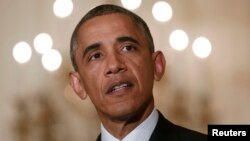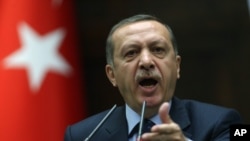WHITE HOUSE —
President Barack Obama welcomes Turkish Prime Minister Recep Tayyip Erdogan to the White House on Thursday for talks on the situation in Syria and other regional security and bilateral issues.
Obama's relationship with Erdogan is among the closest he has with any world leader.
They speak frequently on the phone. Syria has been a key topic as the death toll there continues to mount.
Turkey has played a key role in the provision of non-lethal aid and political support for Syria's rebels.
In a recent NBC News interview, Erdogan urged the United States to take more responsibility to end fighting in Syria. He also discussed evidence of chemical weapons use, saying Obama's "red line" was crossed long ago.
Soner Cagaptay, with the Washington Institute for Near East Policy, says Ankara has major worries about a "weak and divided" Syria, which it is feared could become like Somalia.
"I think Turkey is feeling the heat of the Syria crisis and is here to ask for assistance from the U.S. to help depose the Assad regime and if not to shield itself off from the fallout of the Syria crisis," said Cagaptay. "Obviously [at] the White House there is very little appetite in Washington to send troops or put boots on the ground in Syria, so these two leaders will disagree on what to do although they both agree the Assad regime should go."
On the eve of the talks, press secretary Jay Carney was asked about pressure from Erdogan on President Obama to take a stronger stance on Syria.
Carney stuck to the standard White House description of current U.S. policy, saying the U.S. would work with Turkey and other partners to bring about a political transition in Syria.
"Ways that we can, working together and with our partners, bring about the transition that is so essential in Syria, including the efforts that are under way to revitalize the Geneva Framework for a political transition -- we've been working with the Russians on that matter as well as others -- and including the ways that we are working to provide assistance to the opposition and to the Syrian people," said Carney.
Cagaptay says that despite differences in approach, both men seek the same objectives.
"There are divergences in tactics between the two leaders though I should emphasize that in the end they both want the same thing, they want Assad to go, the question is Turkey wants it faster than the U.S. is willing to commit [to]," he added.
Prime Minister Erdogan and President Obama will hold a joint news conference after their Oval Office talks.
Later, the White House says Obama will host a working dinner with the Turkish leader.
Obama's relationship with Erdogan is among the closest he has with any world leader.
They speak frequently on the phone. Syria has been a key topic as the death toll there continues to mount.
Turkey has played a key role in the provision of non-lethal aid and political support for Syria's rebels.
In a recent NBC News interview, Erdogan urged the United States to take more responsibility to end fighting in Syria. He also discussed evidence of chemical weapons use, saying Obama's "red line" was crossed long ago.
Soner Cagaptay, with the Washington Institute for Near East Policy, says Ankara has major worries about a "weak and divided" Syria, which it is feared could become like Somalia.
"I think Turkey is feeling the heat of the Syria crisis and is here to ask for assistance from the U.S. to help depose the Assad regime and if not to shield itself off from the fallout of the Syria crisis," said Cagaptay. "Obviously [at] the White House there is very little appetite in Washington to send troops or put boots on the ground in Syria, so these two leaders will disagree on what to do although they both agree the Assad regime should go."
On the eve of the talks, press secretary Jay Carney was asked about pressure from Erdogan on President Obama to take a stronger stance on Syria.
Carney stuck to the standard White House description of current U.S. policy, saying the U.S. would work with Turkey and other partners to bring about a political transition in Syria.
"Ways that we can, working together and with our partners, bring about the transition that is so essential in Syria, including the efforts that are under way to revitalize the Geneva Framework for a political transition -- we've been working with the Russians on that matter as well as others -- and including the ways that we are working to provide assistance to the opposition and to the Syrian people," said Carney.
Cagaptay says that despite differences in approach, both men seek the same objectives.
"There are divergences in tactics between the two leaders though I should emphasize that in the end they both want the same thing, they want Assad to go, the question is Turkey wants it faster than the U.S. is willing to commit [to]," he added.
Prime Minister Erdogan and President Obama will hold a joint news conference after their Oval Office talks.
Later, the White House says Obama will host a working dinner with the Turkish leader.












